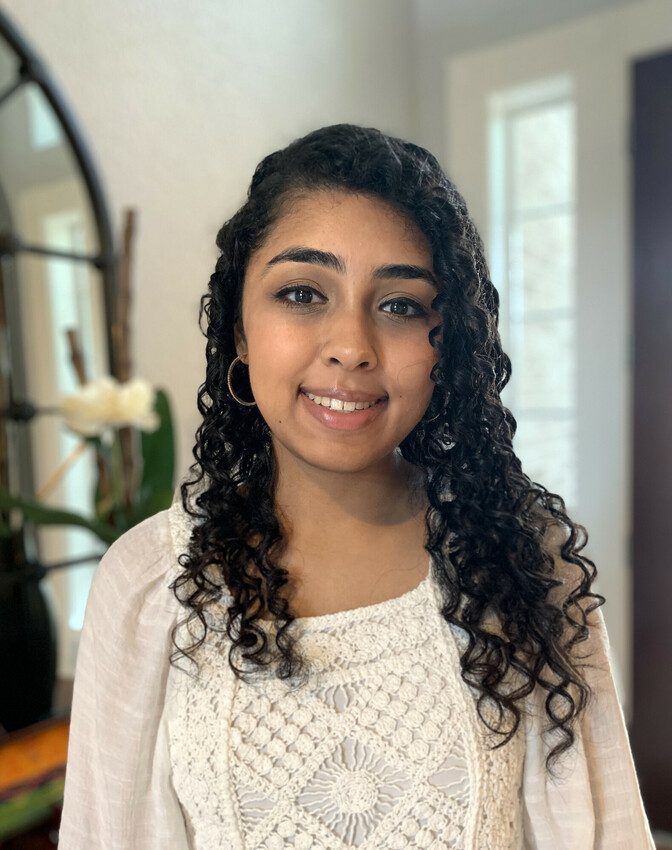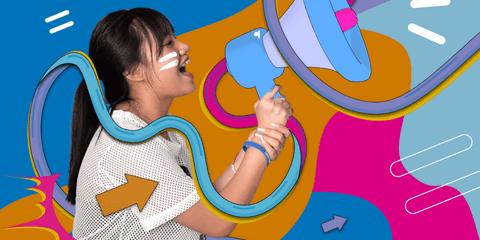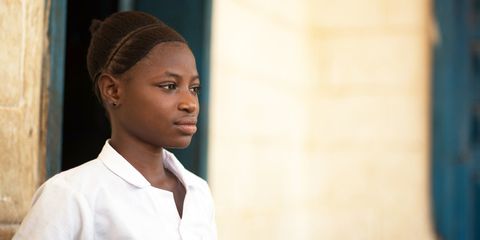Maham has hope for the reproductive rights of girls and young women in the USA
Maham is exploring how she can use her leadership skills to effect change in Texas, after Roe v Wade was overturned in September 2021.

Maham has many passions and goals. The 20-year-old is a pre-med student, looking to work in paediatric oncology or maternal health. She is specifically passionate about reproductive health and justice for women and girls.
Maham was born and raised in Texas, USA which is known as a conservative state, where being political about women’s sexual and reproductive rights can certainly have its challenges, and choices surrounding pregnancy and abortion are rarely openly discussed.
On 1 September 2021, Texas Senate Bill 8 (SB 8) went into effect, restricting abortions and medical counselling related to an abortion after six weeks.
Maham was concerned about what that meant and wrote a 15-page paper about it for her anthropology class.
“I just got super into it and I think that’s where specifically my abortion rights advocacy journey probably began, and at that point the ramifications of SB8 weren’t quite clear. People were still confused as to what was happening, and to see it play out, has been devastating in a way, because the effects that I predicted in my paper, you see them kind of coming to life now. Then more recently with Roe v Wade being overturned.”
The USA Supreme Court overturned the Roe v Wade decision in June 2022, meaning that there is no longer a federal constitutional right to safe and legal abortion, leaving the responsibility of each state to determine the extent to which girls and women in all their diversity can access abortion services.
Almost right after that Supreme Court decision, the Harris County Commissioner’s Court (encompasses Houston and surrounding areas) was set to vote on a resolution to condemn the Supreme Court decision.
Hope for marginalised groups including young women and women of colour
“A couple of my classmates and I who have been working on an abortion rights focus group project for our summer class, gave public comment at the Harris County commissioner’s court hearing that focused on this resolution. It was inspiring to hear some of the stories of incredible women who have been directly affected by this issue, but also saddening to hear the backlash from a couple of the county judges and a few commenters,” says Maham.
“The resolution ended up passing with a 3-2 vote, and although it was a slim margin, it gives me hope for marginalised groups, including women, especially young women and women of colour.”
Maham says she knows there is still so much more work to do in Texas on abortion rights, as abortion is mostly illegal there now, but continuing to get the message out is important. She says the reaction to her work has been positive for the most part.
“I think the reaction to me in politics as a girl has been pretty favourable. But I also know that I come from a place of privilege. I come from a family that definitely encouraged me to get into these things and speak my mind. I come from a family of really strong women.
“My grandma was a single mom. My mom immigrated from Pakistan. They’ve all had to be really strong in their lives and that has allowed me to see women as powerful and kind of leverage that power in myself. The people that surround me are super supportive of me being in politics.”
How to get involved in politics
“Your credibility comes from your experiences, as a girl. And that makes you qualified to advocate for so much.”
Maham says the challenge is getting to a place where your voice is actually being heard. That can be getting in front of politicians but also members of your community. “You have to really build your rapport and relationships with community partners and things like that when you’re doing advocacy work and political work. So I think that’s a pretty big challenge.”
She adds that there needs to be systemic change too. “Having politicians who are willing to bring girls into those spaces and uplift those voices is definitely necessary. Girls who are minorities in their spaces, like socio-economically, racially, those voices are what’s needed,” she continues.
Maham is also involved in work directly with Plan International USA. She is part of the Youth Advisory Board (YAB) which consists of young people from the USA striving to vocalise the needs of youth by serving as Plan International ambassadors. Activities include helping to support the launch of campaigns and co-designing the annual Youth Leadership Academy (YLA).
The YLA is a year-long programme. Young people between the ages of 13-17 join Plan International’s annual YLA event to create sustainable projects that tackle social justice issues they’re passionate about. In a week-long intensive camp in Washington DC, the youth meet and learn from other young activists, influencers and experts on how to make a difference in the most pressing issues in their community and the world.
The YLA places youth in a supportive environment where they develop their personal leadership styles, learn to advocate for policy change, build knowledge of the Sustainable Development Goals (SDGs) and issues around gender inequality. Maham was one of the leaders helping to design this year’s YLA programme and mentors young people.
Inspiration from the young advocates who have come before
“I would hope that someone younger than me can learn something from some of my experiences, just like I’ve learned a tonne from a lot of the advocates that have come before me, who I’ve talked to and have more experience. And I’ve bounced ideas off of,” explains Maham.
She says that is why she enjoys the YLA so much, because she can mentor younger people and help them a whole year with their projects. She also hopes to pass on the message to girls who want to get more involved in politics, that their identity can be their power.
“It’s whatever personal identities you may connect with and being an advocate through those identities is very powerful. Your credibility comes from your experiences, as a girl. And that makes you qualified to advocate for so much. And so I think a lot of times girls and young people don’t realise the power they have in their identities,” says Maham.
One of Maham’s overall long-term goals is also to see a way to fit advocacy into her future career. She says a recent internship she did helped her see how she might be able to do that, and even though advocating in the state of Texas has challenges, Maham is trying to stay optimistic.
“I definitely do think long term changes are possible and probable. And also just like the people I see on the Youth Advisory Board (through Plan International USA) and the initiatives that I’m a part of, (everyone is) very educated and very passionate about the issues that are closest to their hearts. And so I definitely have hope for the future.”


